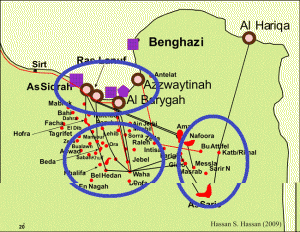By Sami Zaptia.

London, 22 July 2016:
Tribes in control of the inland areas where Libya’s eastern oil fields are located, as opposed to where the coastal exporting ports are located, have distanced themselves from any talks or agreement that may be struck between Petroleum Facilities Guard head and militia strongman Ibrahim Jadhran, and UNSMIL head Martin Kobler.
In a statement released yesterday following Kobler’s arrival at the oil exporting port of Ras Lanuf to meet Ibrahim Jadhran, the Supreme Council for the Wahat Oil, Gas and Water Basin areas, said that any agreement to reopen the oil exporting ports does not cover their areas of oil production and pumping.
The international community and UNSMIL are very keen to ramp up Libya’s oil production and generate more state revenues. They hope that increased revenues would empower the Faiez Serraj-led Presidency Council/Government of National Accord (PC/GNA) and help it become more effective in tackling some of Libya’s chronic problems.
These include the problems of insecurity, lawlessness and high crime, power, water and internet cuts, inflation and high prices, bank cash crisis, internal displacement and shortages in medicine supplies.
Kobler had tweeted during the latest Tunis round of talks that discussions had ‘‘focused on people’s concerns and needs, including power cuts, cash flow and oil production’’. Yesterday he tweeted that he was ‘‘back from Ras Lanuf. Economic development of Libya requires security, political stability and unity’’ and that he was ‘’glad to hear support of PC/GNA from Ibrahim Jadhran and tribal leaders’’.
However, it seems that the tribal leaders that Kobler was presented with were either narrowly selected by Jadhran or did not represent the greater region where most of Libya’s eastern oilfields are located.
Jonathan Winer, the US Special Envoy for Libya, meanwhile tweeted: ‘‘One fundamental reason Libya needs to pump oil: to generate revenues to pay salaries for Libyans. No revenues – no payments – no economy’’.
Britain’s ambassador to Libya Peter Millett for his part told a House of Lords committee on 30th June that the priority is to plan and increase oil production which is less than 200,000 barrels per day down from 1.5 million bpd. He added that production could be increased with a little bit of maintenance to 700,000 bpd ‘‘within months’’.
Millett, however, admitted that the ‘‘obstacles to increased oil production were political” (and not technical or administrative), asking ‘‘are people in control of pipelines ready to permit it…and at what price?’’.
In its statement, the Supreme Council, said that ‘‘any political agreement concluded between the UN Representative, Martin Kobler with any armed groups regarding the recommencement of oil exports is a non-agreement and does not represent the Basin area and its inhabitants and does not represent an agreement for the restart of production from the oilfields and the oil sites situated within the areas of the (seven) Wahat Basin’’.
‘‘The Supreme Council for the Wahat Basin is not committed to any agreement previously referred to without the Supreme Council’s knowledge and agreement’’.
‘‘The Supreme Council will not permit oil production and pumping to restart except through steps and channels decided by the Supreme Council with the permission of the legitimate representatives in the form of the House of Representatives (HoR) and the National Oil Corporation appointed by the Interim Government (headed by Prime Minister Abdullah Thinni)’’.
The exclusive recognition of the Supreme Council of the HoR and its government contrasts greatly with Kobler’s tweet that he was ‘‘glad to hear support of PC/GNA from Ibrahim Jadhran and tribal leaders’’.
‘‘To this end’’ the Supreme Council statement continued, ‘‘we would like to point out to Martin Kobler that those who control the Libyan oil exporting terminals do not in any way represent the production, manufacturing and pumping areas’’, adding that ‘‘if Mr Kobler wishes to talk about the restart of Libyan oil production, he has to communicate with the Supreme Council of the Basin’’.
‘‘The Supreme Council is not committed to any agreement between Mr Kobler and the PFG for the Central Region’’, the statement concluded.







